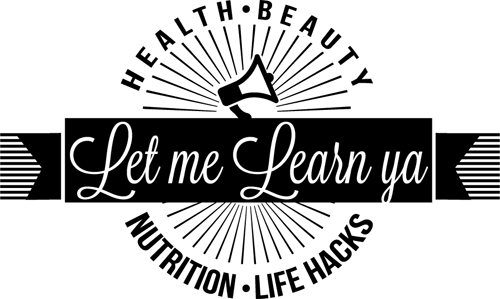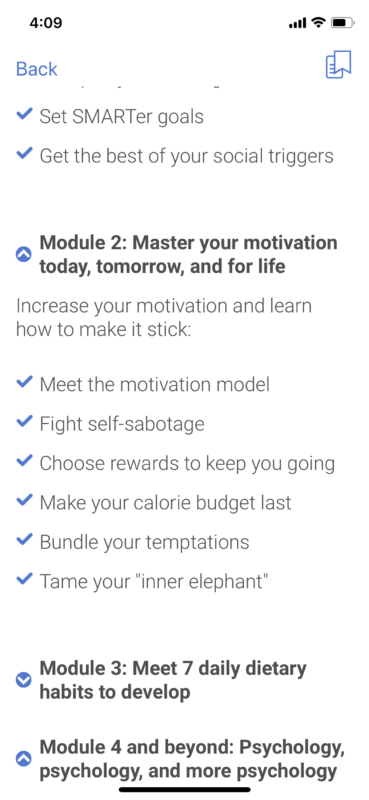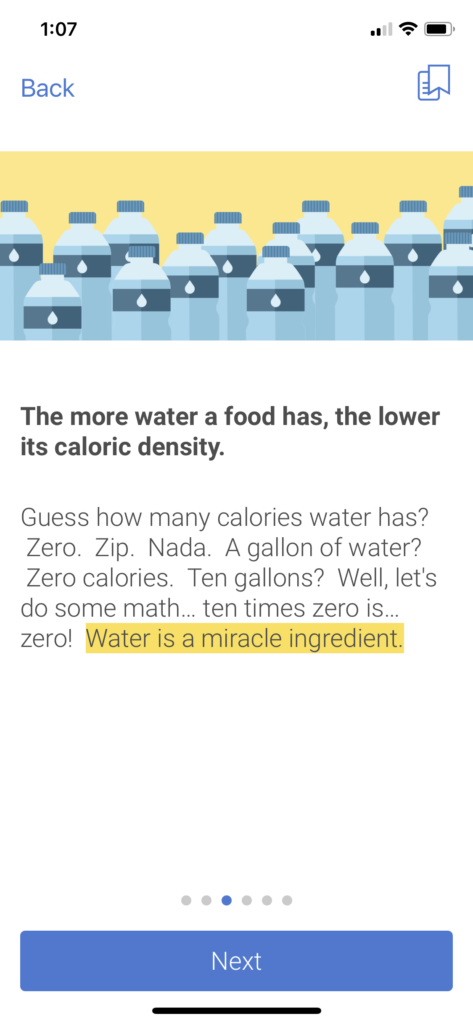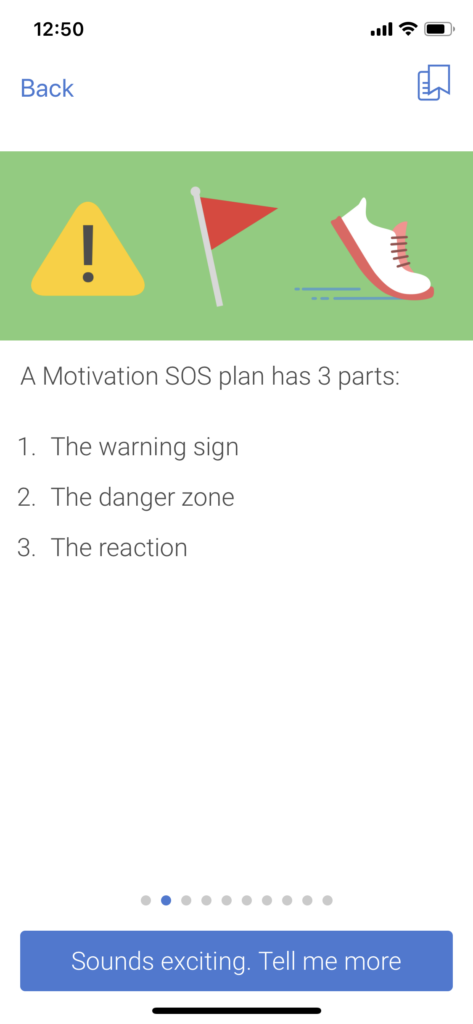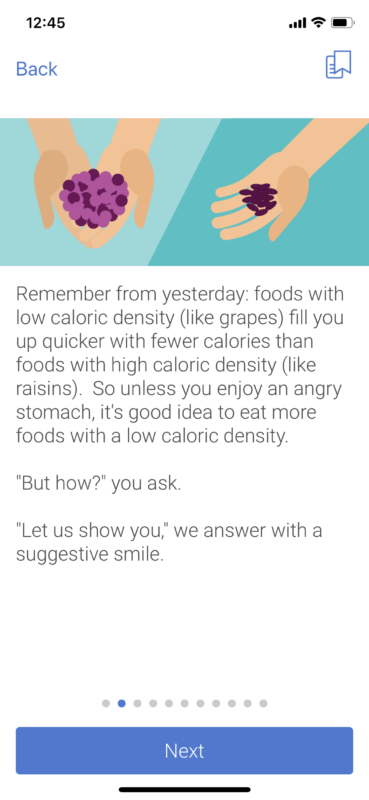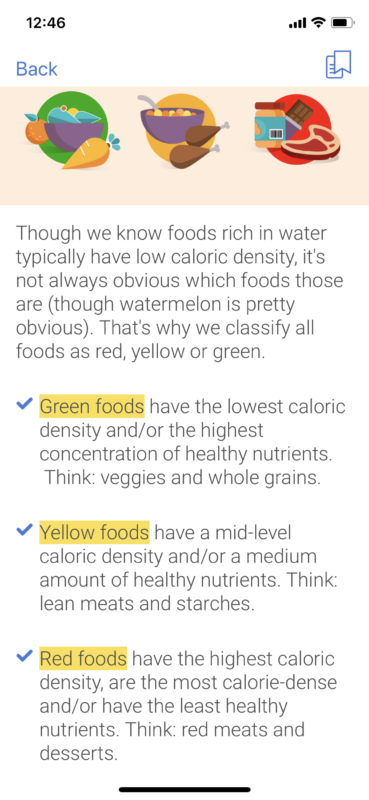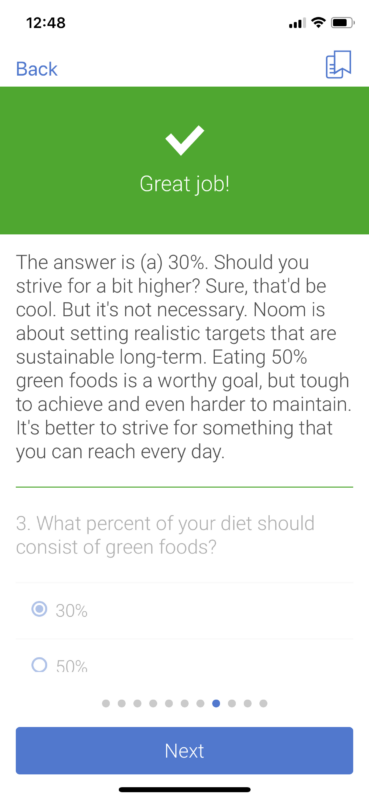Listen, I’m not like a regular dietitian. I’m a cool dietitian. While many of my colleagues were audibly unhappy about the latest diet app called “Noom,” I kept my silence. I wanted to investigate first because I’m…wait for it…a DIETECTIVE.

I’m making up my own nicknames just like Puff Daddy.
So this dietective with two thumbs went undercover and signed up for Noom. I collected way too much information to be contained into one post. I had to split my review into two parts:
Part 1: What Noom is, what you get, how much it costs, what their claims are, and if there is any truth to their claims.
Part 2: My review of and experience with Noom, overall thoughts, and recommendations.
Table of Contents
What is Noom?
Founded in 2008, Noom is (in Noom Inc.’s words):
the world’s leading behavior change company, disrupting the weight loss and healthcare industries. By combining the power of artificial intelligence, mobile tech, and psychology with the empathy of over 1,000 personal coaches, Noom helps people live healthier lives by changing their long-term habits.
Noom inc.
You can easily download Noom to your phone in seconds.
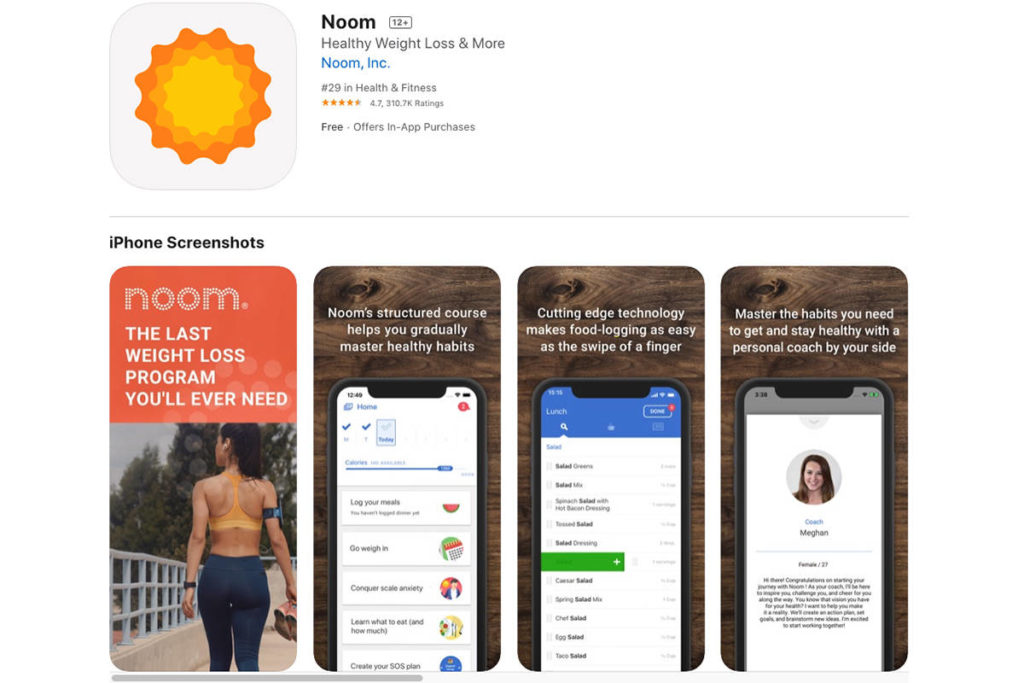
The app contains many features similar to other health and fitness apps, with the addition of some bells and whistles:
- Food tracker
- Exercise tracker
- Water tracker
- Sleep tracker
- Calorie counter
- Step counter
- Simplified food system to guide food choices (similar to Weight Watchers)
- Daily motivational and educational articles (bells)
- Health coach, Dietitian support, or group support (whistles)
How much does it cost?
Noom offers you a free two-week trial period. During this trial you have limited access to features, receive one-on-one coaching, and a quick evaluation that collects your demographic, behavioral, habitual, and nutrition information.

After your two-week trial, you will be charged. That amount varies depending on what package you purchase.

WARNING: Be very careful with the two week trial
In the last three years, over 3,000 complaints were reported to the Better Business Bureau. According to the BBB, the majority of people filing complaints reported that they, “try to cancel the trial offer before it ends but still end up being billed.” Many customers claimed they were ignored by the company or had difficulty getting their money back.
How Noom is different from other diets
It’s “not a diet”
Noom attempts to separate itself from other diet apps by condemning diets and calling itself a “behavior change company.” Noom emphasizes that diets don’t work, detoxing is useless, and willpower is not long-lasting. That sounds great to a dietitian such as myself. Agreed!
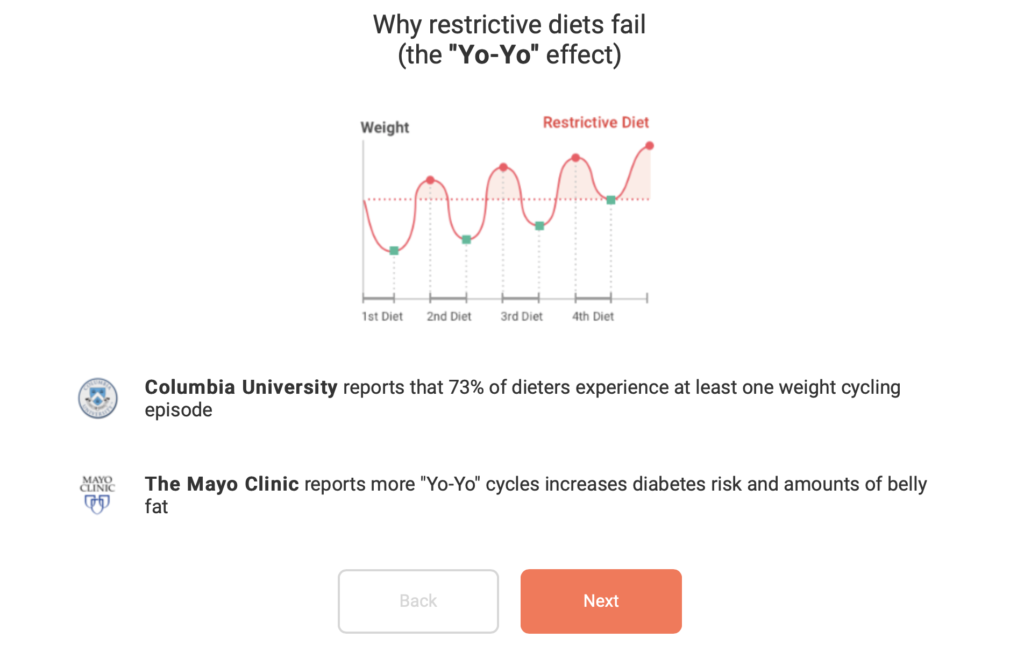
Noom states that you should “quit dieting and get nooming.” But here’s the weird part. Advertisements for Noom state that it is in fact a, wait for it, diet! *Scratches head in confusion*
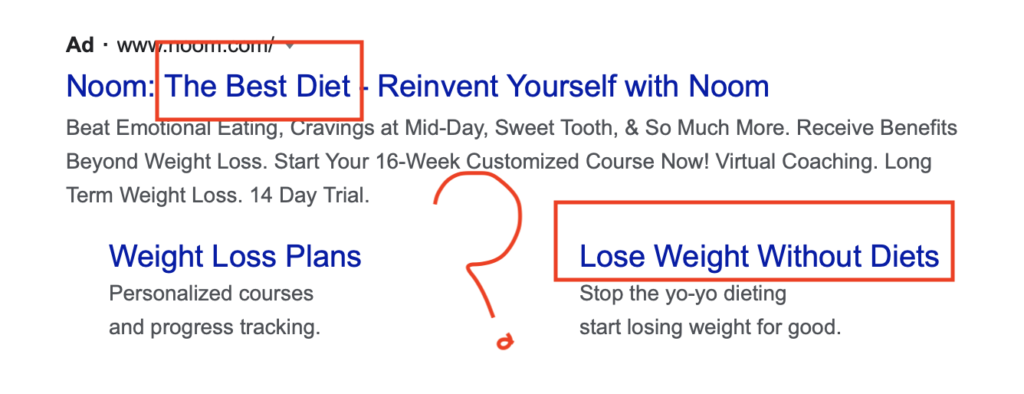
Why does Noom claim that it isn’t a diet (except in some ads)?
Because, according to them, “psychologists created it.” That’s a false statement, which I’ll get to later. They claim to use Cognitive Behavioral Therapy to change people’s eating behaviors, as opposed to restricting calories, removing entire food groups, or intense exercise regimens.
Noom isn’t like a regular diet app. It’s a cool “diet” app.
It has educational articles
Noom teaches you how to set reachable goals, identify triggers of compulsive behavior and impulses, and create back up plans for when you’re triggered. It does this via daily lessons and educational articles.
However, these ain’t articles as I understand the definition of articles to be. You can read these in seconds to minutes. Most are a few sentences with cutesy pictures and/or bullet points.
On one hand, I understand that people don’t like to read anymore. This may be the best way to educate millions while keeping them engaged. On the other hand, the lessons are so superficial, I wonder how much is actually retained and learned. I’d love to see this tested!
Of the people I’ve interviewed who tried Noom, there was a 50/50 response to the behavioral portion of it. Half found it educational and helpful in supporting them to make goals and healthy changes. The other half did not like it and wished it wasn’t included. Of those who didn’t like it, they found the lessons childlike, condescending, and a waste of time.
Psychologists created Noom
As mentioned before, this is a false statement. Noom was not created by psychologists, dietitians, doctors, or anyone formally educated or with any experience in health or nutrition.
I’ll explain more in Part 2, but my first reaction to Noom was “Lol, I bet startup tech folks made this.” I used to work in the “startup/social media/tech” industry, so I can smell startup-folk-creations like a shark smells blood in the water.
Guess what? I was correct.
A software engineer and a self-professed “serial entrepreneur” created Noom. Would you trust a legal advice app created by professional chefs? Wouldn’t you feel better if at least one lawyer or judge was involved?

However, in 2014 they did bring on clinical psychologist Dr. Andreas Michaelides, which is when they added the psychological aspects to Noom. I’m not sure how I feel about this guy though…
Allow me to ask you a question: If I said I was a Registered Dietitian who specializes in weight loss, developing healthy relationships with food, and helping people overcome anxiety and depression, would you think that’s ok? Am I qualified as a dietitian to treat people with psychological disorders?
I hope you said, “no.”

On Dr. Michaelides website, he states that he specializes in, “helping people overcome depression/anxiety, cope with difficult life transitions, and lose weight.” I understand there can be a psychological aspect involved in food and weight, but this just doesn’t sit well with me.
He has no formal training in nutrition or health (none that I could find on his website at least), yet claims an aspect of it as a specialty?
No ma’am, no sir.
Research claims
Noom makes a lot of claims…
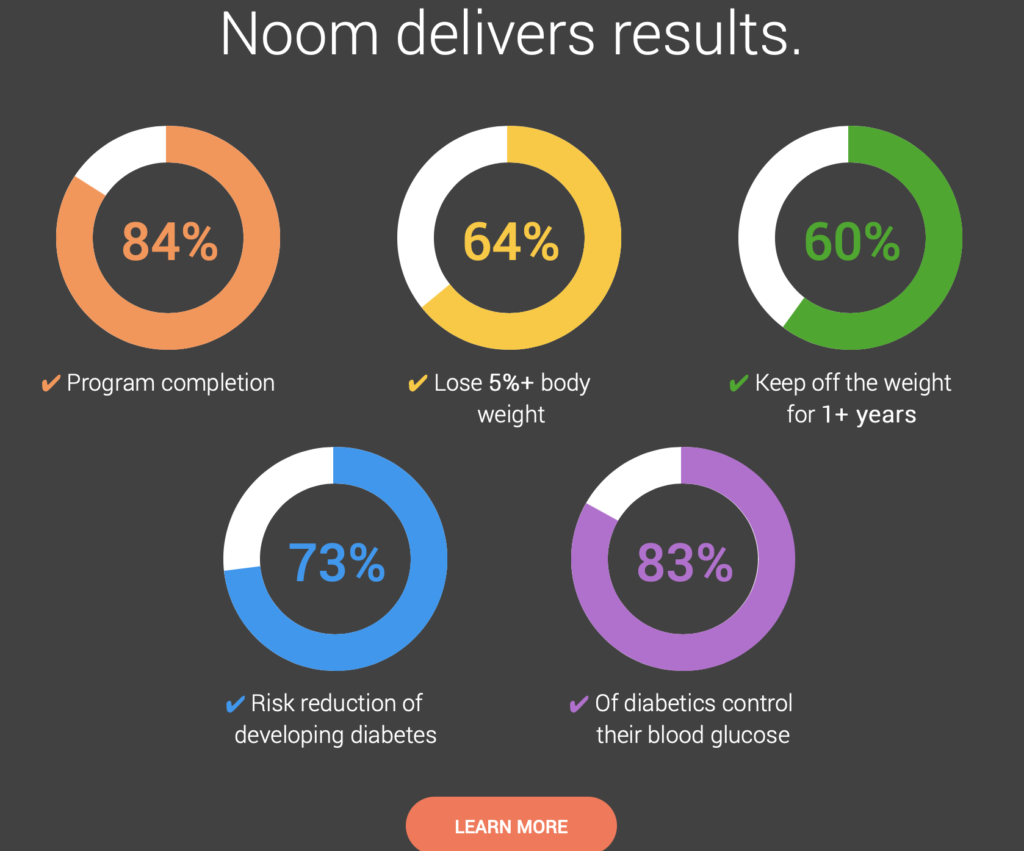
Throughout their ads and sprinkled inside their app, Noom supports these claims by quoting three main research articles:
#1: Study published in BMJ Open Diabetes and Research Care
Noom’s interpretation of the results
Sixty-four percent of Noom users lost 5% or more of body weight, greatly reducing their risk of diabetes and other conditions.
My interpretation of the results
This study was 100% funded by Noom and 100% conducted by Noom employees, which they don’t tell you of course. This can lead to a common phenomenon called, “funding bias.”
Noom also does not share that Noom participants followed the exact pattern observed in 90-95% of restrictive calorie diets. Dieters generally lose around five to ten percent of body weight in the first 3-4 months. Then they hit the dreaded plateau where weight loss slows or stops altogether.
This is evidenced by Noom user’s weight loss rate reducing by 63% at 24 weeks. While Noom users experienced significant weight loss between week one and week 14, there was, “no significant weight loss between week 14 and week 24.” Translation: Participants hit the low-calorie wall.
Summed up: Noom was just as temporarily successful and eventually as unsuccessful as any other diet.
#2: Study published in Scientific Reports
Noom’s interpretation of results
Seventy-eight percent of Noom users sustained weight loss for over nine months.
My interpretation of results
This statement is just plain false. The study reported that, “77.9% of study participants reported a decrease in body weight while they were using the app (median duration of app usage=267 days).
This means that 78% reported weight loss of some sort and at some point while using the app. That could mean some users lost 1-10 pounds and gained it back, lost 20 pounds and kept it off the whole time, or lost 20 pounds and gained it back. Nowhere did the researchers state that 78% of Noom users experienced SUSTAINED weight loss over a nine month period.
Bad Noom. Stop it.
Other interesting results from this study: 1) The majority of female Noom customers started at a normal weight 2) Caloric intake was not associated with weight loss 3) Being male and frequency of weigh-ins were associated with increased weight loss 4) Frequent weigh-ins reduced possibility of yo-yo dieting.
#3: Study published in JMIR MHEALTH AND UHEALTH
Noom’s interpretation of results
Noom ranked #1 out of 800 weight loss applications.
My interpretation of results
Nope. Noom was not rated #1 out of 800 weight loss apps, but instead was rated #1 out of 28 weight loss apps. Apparently their marketing team skims research articles. Out of the 800 apps available in the App Store, the researchers only included 28 apps that met the criteria for their study.
Here is what the authors stated in their results:
Overall, the most popular commercial apps for weight management are suboptimal in quality, given the inadequate scientific coverage and accuracy of weight-related information, and the relative absence of BCTs (Behavior Change Techniques) across the apps reviewed.
Juliana Chen et al.
Translation: The majority of the apps reviewed were bad. Noom was basically in a small and stinky poop contest and found to be the least stinky. The number one ranked poop is still poop, yes?
Final thoughts
What I like
Noom is a visually appealing, extremely accessible application that practically anyone can use. The only limiting factor of accessibility is the monthly cost, which may be too high for many.
Millions of Americans suffering from obesity, diabetes, and metabolic syndrome cannot afford weight loss programs or frequent visits with dietitians. Noom may give many of them an option.

I support the company’s mission. Who could argue with promoting long-term, sustainable changes through behavior change as opposed to fad diet after fad diet? I respect that Noom brings in CBT under the eye of a clinical psychologist. It’s something that, I believe, no other weight loss application does. I also love that they are working to merge tech with health and wellness.
I approve of the addition of health coaches, dietitians, and group support. However, I don’t like how this is executed, which I will discuss in Part 2.
What I don’t like
I don’t trust this company. The health and research claims they make are either misleading, partially true, or completely false. They have a three-year-long history of tricking and deceiving customers as evidenced by the BBB.
The claim that psychologists created the app is also completely false. Engineers with no education or experience with nutrition, health, or psychology created Noom.

They used to have a Chief Medical Officer on board, but he left Noom around 2016. I could not find any other individuals in upper management with any experience in nutrition or health.
Noom is like a teenager going through a personality crisis with, I’m assuming, too many cooks lacking nutrition experience in the kitchen:
- It claims it’s not a diet, but then advertises itself as such.
- It claims it’s not restrictive, but then places people on 1200 calorie diets (more on that in part 2).
- Promotes healthy eating, but then “educates” people to eat in a disordered way (more on that in part 2).
- Promotes long-term sustainable change and cautions about moving too quickly, but then promises 30+ lb. weight loss in 3 months and encourages low-calorie eating.
Overall
My initial impression of Noom Inc. is mostly “meh.” It has too many of the same behaviors of startup companies I’ve worked with and observed in the past. However, I do feel there’s enough good that, if built upon, could become great.
Based on my research, signs are pointing to a negative ending for Noom unless it changes its ways. The dishonest marketing, the theft from customers, the lack of health professionals in upper management positions, and the inconsistent nutrition messaging all lead me to believe it will follow the path of many startups.
That means it will burn super bright and fizzle fast, make the founders millions (if not more) when they sell, and leave the users in the dust.

How I think they could improve:
- Clean up messaging to be consistent, straight forward, and honest.
- Gather more research into the effectiveness of their product.
- Utilize dietitians to improve the product (as opposed to acting as health coaches only).
- Bring more health experts into top positions.
- Focus less on growth and more on sustainability and improving the product.
